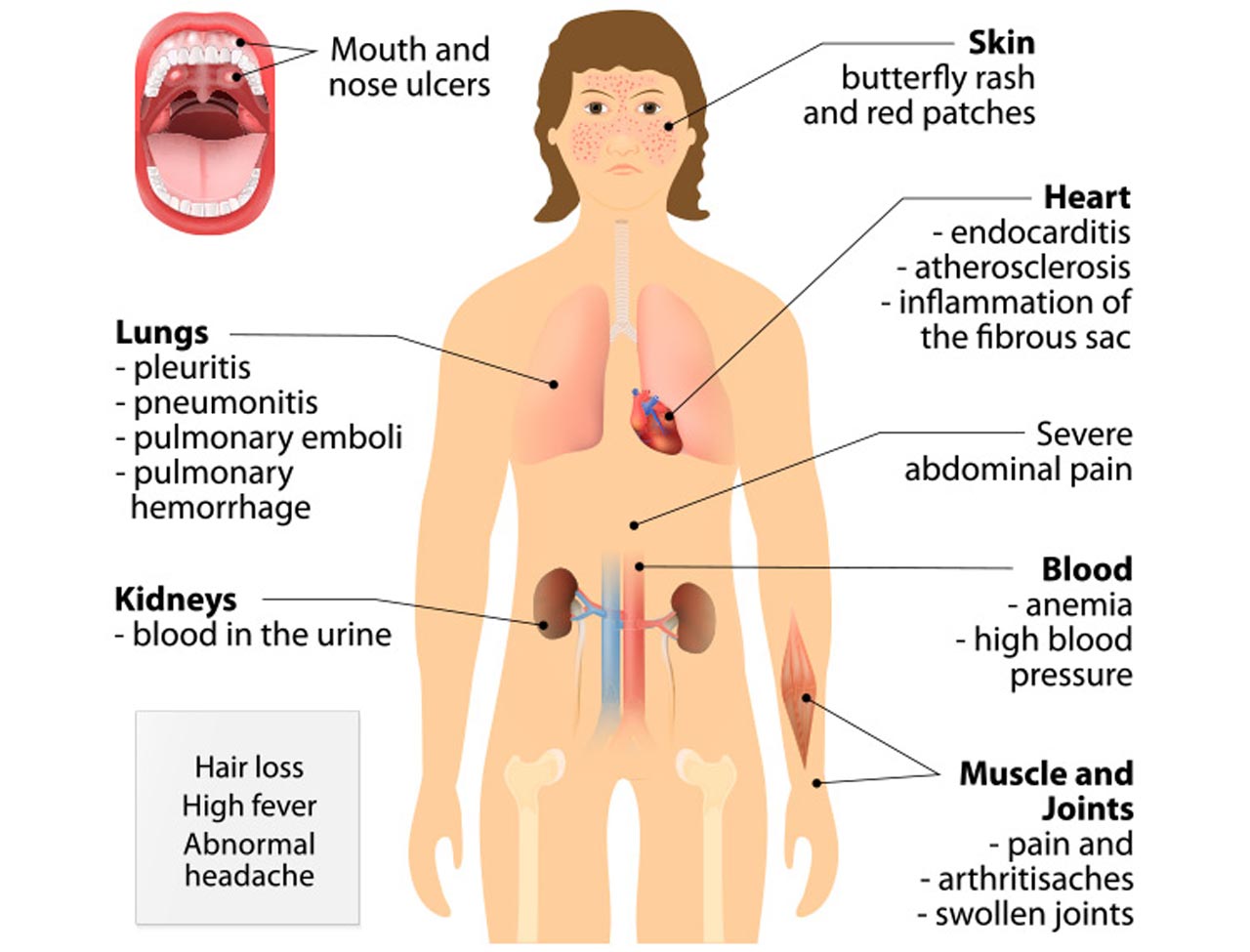 The World Lupus Day was observed last Friday. And to mark the occasion, doctors have advised Nigerians to avoid self-medications. Rather, they should present early and visit their physicians for proper treatment and prevention of the ailment.
The World Lupus Day was observed last Friday. And to mark the occasion, doctors have advised Nigerians to avoid self-medications. Rather, they should present early and visit their physicians for proper treatment and prevention of the ailment.
However, experts explained that lupus potentially affects every organ and all organs of the body, including the skin, joints, lungs, heart, kidneys, liver, brain, womb, eyes, there are specific medications for specific organs. However, the objective of the treatment is to suppress those rebellious white blood cells waging war on the body.
Consultant Rheumatologist at Lagos State University Teaching Hospital (LASUTH), Dr. Olaosebikan Hakeem, said causes of lupus are not known, but certain factors, such as genetic constitution, family history of lupus, infections and drugs, among others, have been suggested.
He said: “Specific prevention method is not known, but persons with family history of lupus or other autoimmune disease have higher risk than those without family history of lupus. We advocate early presentation to a lupus doctor, early diagnosis and early treatment.
“Lupus can be treated and managed effectively. Like other chronic medical conditions, such as hypertension and diabetes, it does not have a cure. Therefore, the treatment is lifelong and avoidance of triggers of flares.
“From our clinic data, about two new cases are diagnosed every week, while about five cases are followed up in a week. A lot of patients cannot afford to buy effective medications and pay for lab tests to monitor disease status.”
Hakeem said government, through the Ministry of health, should set up several training institutions for rheumatology, as there are less than 25 rheumatologists in Nigeria. Health insurance should also be for all Nigerians, both in formal and informal sectors.
He said: “Our laboratory should be equipped to run antibody tests and other special tests used in diagnosis of lupus. We should encourage full-fledged rheumatic drugs production in Nigeria, by supporting pharmaceutical industries. Lupus knows no boundary. It can affect any race, any age and any organs. It is exclusively treated by rheumatologist.”
Consultant Rheumatologist and President, African League of Associations of Rheumatology (AFLAR), Prof. Femi Adelowo said the group of drugs for lupus called immunosuppressives is deployed in different combinations. They include steroids, hydroxychloroquine, azathioprine, mycophenolate mofetil, cyclophosphamide, cyclosporine, tacrolimus, dapsone and thalidomide. There are still some unmet needs in terms of treatment.
He said: “Systemic Lupus Erythematosus (SLE) often shortened and called Lupus is a condition belonging to the group of diseases called auto-immune diseases. There are many other conditions classified under this particular group, such as Scleroderma, polymyositis, dermatomyositis and antiphospholipid syndrome. Lupus is a rheumatological condition characterised by episodes of acute and chronic inflammation in the body.”
Adelowo explained that for over 10 years, two new effective agents have been produced by biotechnology and directed at a particular form of white cell called blymphocytes.
He said: “These cells appear to be a major culprit in setting up the inflammation causing damage to tissues. The two available are Rituximab and belimumab. Any of the drugs mentioned is not to be self-administered. The Rheumatologist is trained to handle the administration and adverse effects.
“Challenges with management of lupus include, ignorance as to the nature of this condition, which often causes delay in diagnosis and management, high cost of requisite investigations and medications, lack of government support for a condition that is treated for long period and taps the sufferer’s and family resources, non-availability of standard investigations and medications in many centres, lack of manpower critical to diagnosing and managing lupus overall. If presented early, lupus patient has identical survival as normal persons.
“Our blood is mainly fluid, but embedded in it are distinct cells, not obvious to the human eyes, but can be seen when we look in the microscope. There are three basic types of cells. These include red blood cell, which transports oxygen hormones and nutrients from one part of the body to another. The haemoglobin in them is what gives life.
Platelet cells plug our skin and any damaged organ when there is injury and thus prevent us from bleeding to death. The white blood cells are the body’s soldiers. And like all soldiers, they are arranged into various divisions, companies or battalions.
Each grouping has specific ammunition to fight enemies, which are germs that abound in the food we eat, the water we drink and the air we breathe. These white cell soldiers are forever patrolling in our blood vessels, rounding up germs and killing them.
Our body does not normally fight itself because our ‘soldiers’ white blood cells recognise what is self because of the uniform protein that the cells have.
But for some reasons that medical science does not quite understand, some of these soldiers gang up together and become rogue cells (area boys). They start to attack the body and not the germs. They carry out what some of our soldiers were notorious for in past, coups. Of course, loyal white blood cells often resist and there is a lot of (roforofo) fight with resultant destruction and formation of immune complexes. It is these that cause inflammation and damage.”
Adelowo disclosed that the World Health Organisation (WHO) designated May 10 every year as World Lupus Day to draw community’s attention to this otherwise serious and poorly understood illness.
He said: “Previously, the ailment was rare among black Africans, which we now know to be contrary. Many of the studies showing the fallacy of this assumption of rarity were done in Nigeria. We know that SLE is quite common and many sufferers often come to harm because of this poor knowledge.
“While it can affect any age group, children inclusive, it however has a predilection for women of child bearing age, women in their twenties and thirties. It rarely affects males. Female to male ratio is about 9.1 per cent.”
Adelowo stated that Rheumatologists have been trained in the management of this condition and early referral makes a lot of difference. If the General practitioner sees a patient with above symptoms, an early ESR will point towards the diagnosis. The ESR will be very high in the neighbourhood of 80 and above. He should refer immediately.
“Lupus patients must also use sunscreen, as excessive sunlight predisposes to attacks. They should avoid physical and emotional stress. They should eat well and rest. Overall, we have in our custody very effective medications and we can switch from one to another, as the case may be.
“The commonest presentations among Nigerian patients are recurrent fever, which is mistakenly managed as malaria fever, persistent typhoid without a sustained improvement. Our patients also present with joint pains and extreme fatigue. Many of them are short of blood (anaemia) and are often transfused with blood over and over again without sustained improvement. They also present with mouth sores, sore throat, chest pain and cough. Skin rashes are common, as well as significant loss of hair, especially while combing.
“A few patients will present with seizures and sometimes psychotic behaviour and depression. Kidney involvement is particularly common among our patients, and may predate other manifestation of Lupus.”
[ad unit=2]






